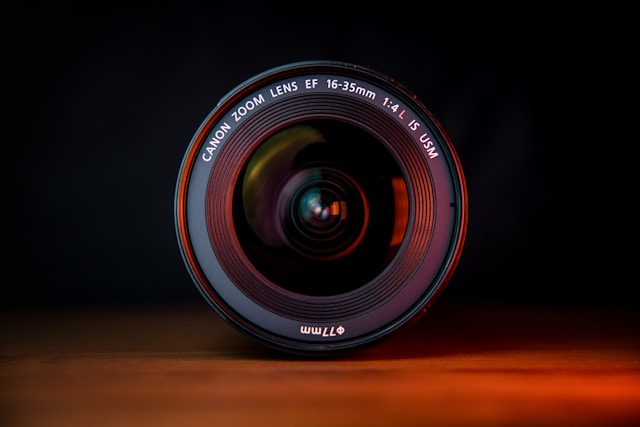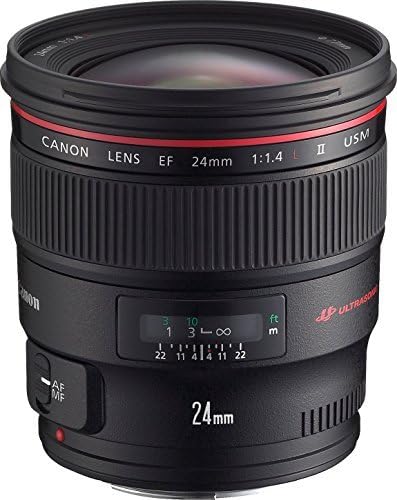
Choosing the right lens is one of the most important decisions you’ll make for astrophotography.
A good astrophotography lens lets in as much light as possible, keeps stars sharp across the frame, and suits the type of night‑sky images you want to capture — from wide Milky Way landscapes to tighter star fields.
Canon have an excellent reputation built over many years for providing top quality lenses. In this article, we’ll explore five of the best Canon lenses for astrophotography (EF, EF‑S, and RF mounts).
If you’re looking for Sony/Nikon lenses, I cover those in separate dedicated posts.
Disclosure: This post contains affiliate links. If you buy through these links, I may earn a small commission at no extra cost to you. As an Amazon Associate, I earn from qualifying purchases.
Quick Verdict (If you’re short of time)
Best overall Canon lens: Canon EF 24mm f/1.4L II USM — exceptional light‑gathering and sharp stars
Best wide‑angle zoom: Canon EF 16–35mm f/2.8L III USM — versatile for Milky Way landscapes
Best Canon RF option: Canon RF 15–35mm f/2.8L IS USM — excellent optical performance for mirrorless users
Best budget Canon lens: Canon EF 50mm f/1.8 STM — cheap, fast, and surprisingly capable
Best for APS‑C cameras: Canon EF‑S 24mm f/2.8 STM — lightweight and affordable
Best Canon Lenses for Astrophotography
Canon EF 24mm f/1.4L II USM — Best Overall
If you’re serious about astrophotography, the Canon EF 24mm f/1.4L II USM is widely regarded as one of the best Canon lenses ever made for the night sky.
The ultra‑fast f/1.4 aperture lets in huge amounts of light, allowing you to shoot shorter exposures at lower ISO — ideal for capturing faint Milky Way detail with minimal noise. Star sharpness is excellent, especially when stopped down slightly to f/1.8–f/2.
Why it’s great for astrophotography:
- Extremely bright f/1.4 aperture
- Excellent edge‑to‑edge sharpness for stars
- Ideal focal length for Milky Way landscapes
Best for: Full‑frame Canon DSLR users who want top‑tier results.
Canon EF 16–35mm f/2.8L III USM — Best Wide‑Angle Zoom
For photographers who want flexibility, the Canon EF 16–35mm f/2.8L III USM is the best wide‑angle zoom in Canon’s EF line-up for astrophotography.
At 16mm, you can capture sweeping night‑sky landscapes, while 24–35mm is perfect for tighter Milky Way compositions. The constant f/2.8 aperture performs well for long‑exposure night shots, and optical performance is excellent across the zoom range.
Why it’s great for astrophotography:
- Versatile focal range
- Strong corner sharpness for a zoom lens
- Professional‑grade build quality
Best for: Astrophotographers who want one lens for multiple night‑sky compositions.
Canon RF 15–35mm f/2.8L IS USM — Best Canon RF Lens
If you’re shooting with a Canon mirrorless camera, the Canon RF 15–35mm f/2.8L IS USM is the standout choice.
While image stabilisation isn’t useful for stars, the optical quality of this lens is outstanding. Stars remain sharp across the frame, and the 15mm wide end is excellent for expansive Milky Way shots.
Why it’s great for astrophotography:
- Superb RF‑mount optics
- Wide 15mm field of view
- Weather‑sealed L‑series construction
Best for: Canon EOS R‑series users wanting premium wide‑angle performance.
Canon EF 50mm f/1.8 STM — Best Budget Canon Lens
Often called the “nifty fifty,” the Canon EF 50mm f/1.8 STM is one of the cheapest ways to get started with astrophotography.
While it’s not perfect wide open, stopping down slightly delivers surprisingly good star sharpness. The longer focal length is ideal for tighter compositions, constellations, and tracked deep‑sky shots.
Why it’s great for astrophotography:
- Very affordable
- Fast f/1.8 aperture
- Lightweight and easy to use
Best for: Beginners on a tight budget.
Canon EF‑S 24mm f/2.8 STM — Best for APS‑C Cameras
For Canon APS‑C DSLR users, the Canon EF‑S 24mm f/2.8 STM is a solid entry‑level option.
On a crop‑sensor camera, this lens delivers a field of view equivalent to roughly 38mm, making it well suited to wider star fields rather than ultra‑wide landscapes.
Why it’s great for astrophotography:
- Compact and lightweight
- Sharp for its price
- Ideal for beginners using APS‑C bodies
Best for: Entry‑level Canon APS‑C astrophotographers.
Canon Lens Comparison Table
| Lens | Mount | Focal Length | Max Aperture | Best For | Skill Level |
|---|---|---|---|---|---|
| Canon EF 24mm f/1.4L II USM | EF | 24mm | f/1.4 | Milky Way, night landscapes | Intermediate–Advanced |
| Canon EF 16–35mm f/2.8L III USM | EF | 16–35mm | f/2.8 | Wide‑angle sky panoramas | Intermediate |
| Canon RF 15–35mm f/2.8L IS USM | RF | 15–35mm | f/2.8 | RF mirrorless users | Intermediate |
| Canon EF 50mm f/1.8 STM | EF | 50mm | f/1.8 | Budget astrophotography | Beginner |
| Canon EF‑S 24mm f/2.8 STM | EF‑S | 24mm (APS‑C) | f/2.8 | APS‑C wide fields | Beginner |
What to Look for in a Canon Astrophotography Lens
When choosing a Canon lens for astrophotography, prioritise:
- Wide aperture: f/2.8 or faster is ideal
- Focal length: 14–24mm for Milky Way, 35–50mm for tighter star fields
- Coma control: Important for sharp stars near the edges
- Manual focus precision: Essential for night shooting
Final Verdict
Canon offers some excellent lenses for astrophotography, especially in its professional L‑series lineup. If you want the best possible results, the Canon EF 24mm f/1.4L II USM is hard to beat.
For versatility, the 16–35mm f/2.8L III is a fantastic all‑rounder, while beginners can achieve impressive results with budget options like the 50mm f/1.8 STM.
If you’re comparing systems, you may also want to check out my dedicated guides to Sony astrophotography lenses and Nikon astrophotography lenses, where I break down the best options for those camera systems.
Frequently Asked Questions
Yes, f/2.8 is fast enough for astrophotography, especially when using wide-angle Canon lenses. While faster apertures like f/1.4 let in more light, many Canon f/2.8 lenses deliver excellent sharpness and low coma when stopped down slightly.
Canon RF lenses often offer improved optical performance, but EF lenses remain excellent for astrophotography. Many EF lenses, such as the 24mm f/1.4L II, are still among the best options and work perfectly on RF cameras with a Canon EF-to-RF adapter.
Yes, Canon kit lenses can be used for basic astrophotography, especially for learning the fundamentals. However, their slower apertures and softer corners limit light-gathering and star sharpness compared to faster prime or professional Canon lenses.
No, image stabilisation is not needed for astrophotography. Since night-sky images are taken on a tripod, stabilisation should be turned off to avoid unwanted motion during long exposures.
Yes, Canon APS-C cameras are capable of producing excellent astrophotography images. While full-frame cameras perform better in low light, APS-C bodies paired with fast Canon lenses can still capture detailed star fields and the Milky Way.




